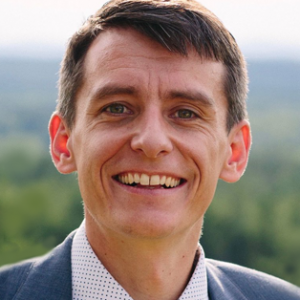Brian Cleary joins the CDS Faculty at BU
 Boston University is proud to welcome Brian Cleary as assistant professor in the Faculty of Computing & Data Sciences (CDS) and a core faculty member in the Bioinformatics Program. Brian will also hold appointments in the Biology and Biomedical Engineering departments, and in the Biological Design Center (BDC) at the Rajen Kilachand Center for Integrated Life Sciences & Engineering, where he will be setting up his experimental lab.
Boston University is proud to welcome Brian Cleary as assistant professor in the Faculty of Computing & Data Sciences (CDS) and a core faculty member in the Bioinformatics Program. Brian will also hold appointments in the Biology and Biomedical Engineering departments, and in the Biological Design Center (BDC) at the Rajen Kilachand Center for Integrated Life Sciences & Engineering, where he will be setting up his experimental lab.
"It takes a village!" is how Associate Provost for CDS, Professor Azer Bestavros, described the collective effort (also involving the College of Arts & Sciences and the College of Engineering) leading to the recruitment of Cleary to BU. "His research straddles the traditional disciplinary boundaries for computer science, statistics, information theory, systems biology, and biomedical engineering, making CDS a natural academic home for him," says Bestavros. "Even his lab will straddle the Commonwealth Ave boundary between the CDS and Kilachand Centers!"
"Cleary’s work addresses fundamental problems, both biological and computational, with particular focus on problems associated with human disease," noted Biomedical Engineering Professor and BDC Director, Chris Chen, adding that "he will provide an exciting new bridge between BDC and CDS."
For the last three years, as an Independent Broad Fellow at the Broad Institute of MIT and Harvard, Brian Cleary led a research team of trainees and research associates who "believe that the best approach to studying living systems is through a deep connection between computational and biological knowledge," according to the web site of the Cleary Lab at the Broad Institute.
Brian's work aims to move beyond predictive tasks toward theoretical understandings that change how we think and what we do. Through a truly interdisciplinary mixture of bench-side and computational research, he applies paired computational and experimental methods to efficiently study the spatial organization of gene expression in tissues; to develop and connect emerging methods in machine learning with experimental design and new systems-level theories of cellular and tissue physiology.
Commenting on this line of work, Chemistry Professor Tom Tullius who directs the BU Bioinformatics Program noted that Cleary’s "groundbreaking idea to use algorithms as a lens to design innovative biological experiments" represents a new and exciting direction in computational biology. "We are looking forward to the exciting new science that he will bring to BU and the growing connection between CDS and Bioinformatics," Tullius added.
"Thrilled to welcome Brian to BU," Assistant Professor of Biology and CDS Faculty Fellow Ana Fiszbein noted that "Brian will bring an algorithmic lens on biology that resonates with much of what we pursue in CDS." By applying that lens to the study of cellular and tissue physiology using random composite experiments, Cleary and his team developed new, highly-efficient computational and laboratory methods for composite imaging transcriptomics, composite genetic perturbations, viral infection screening, and viral inhibition assays.
Commenting on his recent framework to study gene expression profiling with compressed sensing and random composite measurements, as well as his new models for studying developmental processes at single-cell resolution and virus-antibody interactions, Fiszbein added that "his work on the spatial organization of gene expression revolutionized the way we think about the limits of what can be learned about complex living systems. These results show the truly integrative nature of his scholarship. I am proud to have Brian as a colleague and cannot wait to work together."
After completing his undergraduate studies at Caltech with dual degrees in Biology and in Business, Economics, and Management, Brian spent 8 years developing algorithms for trading of index derivatives at a couple of startups before pivoting back to academia for his doctoral studies, which he completed in 2019 with a PhD in Computational and Systems Biology from the Massachusetts Institute of Technology.